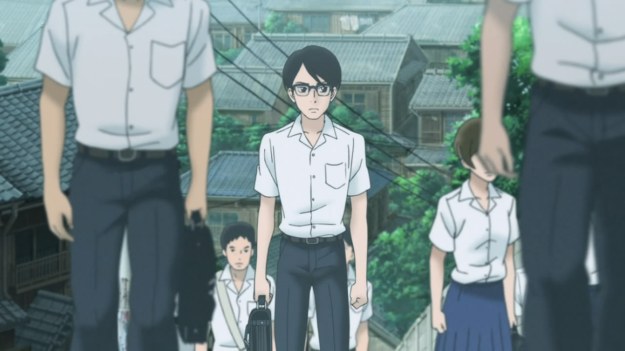Initially, our narrator Kaoru comes off as though he’s a straight-up misanthrope: “I hate everything about this. This sunshine, beating down on you from morning onward… These students, who don’t have a thought in their heads… It all makes me want to throw up.” He even takes the time to mock his classmates’ dialect. Maybe Kaoru is justified in his hate; it would appear as though some people are as quick to judge him as he judges them. But then again, why treat everyone so disdainfully just because of a few bad eggs?
We learn early on that Kaoru has spent a lot of his time transferring from one school to another. As a result, it’s reasonable to assume that he often gets little chance to forge any meaningful friendship. Even if he does, those bonds are quickly undone if and when he is forced to move again. So I wonder, then, if Kaoru’s worldview isn’t just a reflection of a bitter attitude born from an unfortunate set of circumstances. Imagine prejudice as a shield: you can just skip the whole heartbreaking cycle of making friends just to lose them altogether if you treat everyone like trash from the onset.
My impression of Kaoru is that he has settled into a routine. His life has developed a pattern to which he resides comfortably within. After all, he has a condition where “even minor stress would trigger nausea.” A routine would thus make life predictable, and when life is predictable, stress becomes manageable. Of course, he can’t homogenize every single variable in his life, but when bad things happen–like, say, someone throwing a ball at his head–, Kaoru relies upon predictability. In the first episode, a minor incident compels our narrator to try to escape to the school’s rooftop. I can only imagine how many times Kaoru has made similar treks up countless flights of stairs.
Sentaro, however, prevents Kaoru from reaching the rooftop, thus breaking his routine. At first glance, Sentaro would appear as though he’s a school brute like the others who have picked on Kaoru, but the former is just as out of step with his peers as the latter. This commonality allows the two to form a connection despite Kaoru’s predictable reluctance. Jazz, then, makes all too much sense as a vehicle for their friendship. Jazz is all about the offbeats and the notes you don’t (but not that you can’t) hear–the freedom to break free from structure and improvise. And for someone in a rut, improvisation is just what Kaoru needs.
When I first watched the episode, I was initially struck by the show’s overall silence. At times, a jazz track would kick in, but more often than not, we hear only dialogue and ambient sounds. Watching the episode again, I then realized the soundtrack’s pivotal role in developing the characters–believe it or not. Every time a jazz track plays, expectations are being defied. The first time we hear jazz, Sentaro goes against all odds and fights three seniors at the same time. The second time we hear jazz, we see Sentaro chasing after Kaoru on the rooftop despite the heavy rain pouring down on them. Each time, Sentaro betrays Kaoru’s preconceptions. For instance, he thought hanging out on the rooftop would be too boring for anyone else, but Sentaro makes a game of it; he improvises: “This feels good… Richie, you take a shower, too! … What are you scared of, huh? Nothin’ good’s ever come of fear. Let yourself get a little wet.”
Kaoru tells us that playing the piano allows him to forget bad memories. Ironically, however, both instances of classical piano solos in the episode bring about emotional pain. First, a classical piece plays as Kaoru recalls his father leaving him behind. Just moments later, at his cousin’s urging, Kaoru plays another classical piece. This only gets him scolded by his aunt, who can’t help but sneak in a few underhanded barbs about both his mother and father. Classical music, in its structure and form, thus appears to represent memory. To remember is to relive a part of life you can never change. Although we can quibble over the reliability of human memory, let’s just take the classical approach that memories are snapshots of distant moments trapped forever in a prism of time. There’s nothing inherently negative about classical music and the same can be said about memories. Unfortunately, Kaoru doesn’t seem to have a whole lot of happy memories.
In direct contrast with Kaoru’s timid demeanor, one that belies his placid contempt for most of his peers, Sentaro brims with energy. Even when he’s supposed to sit idly, he drums with a pair of pencils in his hands. When Sentaro later performs a drum solo for Kaoru, the latter initially winces at the cacophony of sound. But eventually, Sentaro’s music, and thus his energy, overwhelms the bespectacled young man–much like how Sentaro chased Kaoru down on the rooftop.
Of course, Rome wasn’t built in a day, and likewise, our two protagonists aren’t in harmony yet. Their interpretation of the same song lies far apart when they take turns playing it on a piano. Even in this scene, we see how Kaoru adheres to structure and pattern: “What are you talking about?! I played it exactly right.” Sentaro counters that Kaoru lacks swing, but his follow up statement is even more telling: “If you play it without feelin’ it, it don’t sound like no jazz to me!” Yes, jazz is all about swing, but when you’re really feeling it, you’ll finally understand that the notes on the page are just an approximation. In any case, Sentaro helps Kaoru defy his expectations of himself this time: although the latter initially wanted to buy a classical album, he eventually leaves the music store with a copy Art Blakey and the Jazz Messengers’ “Moanin’.”
Sakamichi no Apollon has a simple premise: a socially awkward student finds an unlikely friendship in another outcast. The music, however, is key. It adds much needed depth to a trope that isn’t exactly fertile grounds for originality. I’m eager to see how the show develops the motif as it progresses. Until then, let’s listen to some jazz.





I don’t have much to add honestly, but I just wanted to say that this was an excellent post. Thank you.
This is by far the best post of yours that I’ve read in months.
Another point, made by Avvesione: neither Kaoru nor Sentaro knew who the other was when they met for the first time, as the delinquent or the transfer student. That prevented them from pigeon-holing each other in the tyranny of the high school structure, and see each other as they are.
Not sure if compliment, or sly insult.
…
I kid, I kid.
Yeah, that’s a good point, though I suspect Sentaro is the type to headbutt his way into someone’s life as long as he sees you as a bud. What makes me say this? Nothing, really; just a hunch.
Great post about a great episode! Much like Kaoru, I was really drawn in by Sentaro’s charisma. The awesome drum solo also helped. :) I kinda expect this series to be steady and moving with beautiful music, rather than super dramatic.
I’m glad this show came before Tsuritama (rather than the other way round) though. Tsuritama is weird and comical anyway so the similarity just added to the humour, but I reckon it would have detracted from Apollon.
Hm, I watched this one second.
Oh. Did you spend the episode thinking “Hey I’ve just seen this scene”? Because that’s what I was thinking throughout Tsuritama. I expect them to diverge more next week.
Despite what the second pic implies, I did Tsuritama first. I initially thought I liked it better than Sakamichi no Apollon, but I’ll see how I feel about it now when I rewatch it later (for a post).
A whole bunch of my Asian friends just up and yelled “I KNOW THAT FEEL, BRO” during Kaoru’s memory spiel. They’re probably joking, but when I think about the social entrapment of a young boy in a high-expectations society I suddenly start feeling more empathetic about his (albeit worse) struggles. Classical music, especially the playing of it, evokes many of my own past memories, but those were for the most part happy memories. All of Kaoru’s classical music, on the other hand, reminds him of his very depressing past, and it’s even more depressing to see that his family is the reason why he is so compelled play music yet is repressed by the same token.
It’s probably a no-brainer that he will create much happier memories by applying himself to the strange and atypical genre known as jazz with a bunch of supportive people by his side, but learning how he does so will be a weekly treat for me.
Y’know, the scene with the aunt was pretty damn infuriating. Then I remember how my Asian relatives were pretty much the same way. As a result, the scene became bitterly funny. Like a grapefruit. God, I hate grapefruits.
I dunno why I posted that video. I guess I’m kind of in a stream of consciousness mode right now.
Maybe he’ll even reconcile classical with jazz. There are some nice jazz renditions of classical songs out there.
wana see what you make of tsuritama since thier so similar in premise
I’m still mulling it over.
Great post!
This is a rather minute detail but one of the things I appreciated most was that moment where Kaoru and Ritsuko start talking in the hallway (prior to her inviting him to her family’s store) and Kaoru takes off his glasses seemingly nonchalantly. It’s a clear callback to the moment in the show where Ritsuko compliments Kaoru on having a “pretty” face. Imo, it was a delightfully understated but very expressive gesture. Maybe I’m too easily impressed but it’s just that that kind of thing is pretty rare in most anime.
The premise reminds me of Beck, but with jazz! i.e. disillusioned youth has his eyes opened by a rebellious, yet musically gifted punk–kindling friendship along the way. Ah, coming-of-age stories are done to death, but when done well, they’re timeless. Both shows seem to be tactful with music placement, and characters have a strong presence in their roles. And you can’t go wrong with Yoko Kanno’s jazz. Looking forward to the next episode.
Apollon’s premise reminds me of Beck, but with jazz! i.e. disillusioned youth has his eyes opened by a rebellious, yet musically gifted punk–kindling friendship along the way. Coming-of-age stories have been done to death, but when they’re done well, they’re timeless. Both shows seem to be tactful with music placement, and characters have a strong presence in their roles. Plus Yoko Kanno’s jazz! Looking forward to the next episode.
Hm, I haven’t seen Beck. Guess I should give it a shot?
Sure! That is, if you’re not repulsed by heavy rock and off-putting Engrish. I’d suggest watching the dub to avoid the latter. Some complain it’s slow burning, but I find it one of the few realistic slice-of-life series that stresses character growth and progression instead of the typical, rose-colored shenanigans of other slice-of-life anime.
Ah, thanks for the recommendation. Weird to hear someone suggest the dub. I’ll see if I can find it somewhere.
Pingback: illusions of the mind « AW
Sakamichi sure is the way to the heart. Tsuritama is just a lot of drugs that try to be cute and adventurous- and to me Yuki’s anxious expressions are just another version of Naruto’s ugly crazy power display =.=
Your remarks are really outstanding! Thanks for the enlightening post. Keep up the good work :)